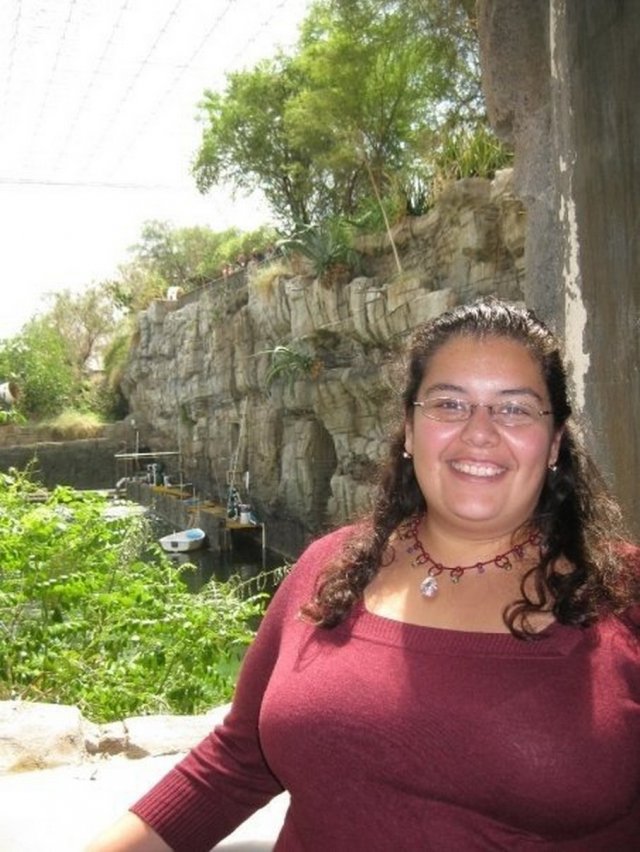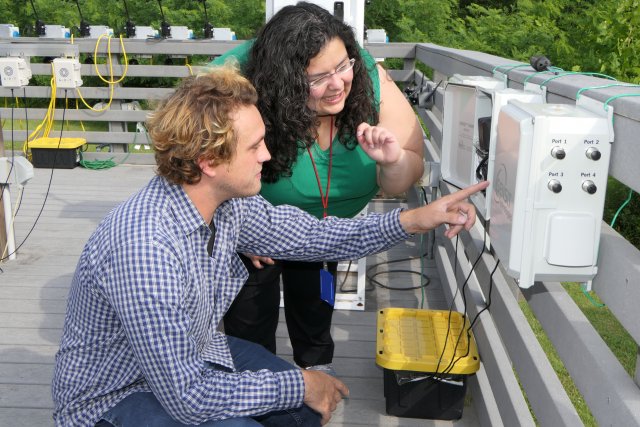Meet EPA Physical Scientist Andrea Clements, Ph.D.

Dr. Andrea Clements is a physical scientist interested in characterizing ambient air quality. She holds a mathematics degree from Cornell College and engineering degrees from Washington University in St. Louis, the California Institute of Technology, and Rice University. Her graduate research focused on characterizing ambient aerosols. Prior to joining EPA, she worked as a postdoctoral scholar at Colorado State University where her research focused on identifying volatile organic chemicals (VOCs) emitting from oil and gas drilling operations. At EPA, she works to identify and characterize emerging technologies for measuring air quality including air sensors. Her work also involves creating guidance for manufacturers and users to test the performance of sensors, developing methods to improve sensor data quality, finding appropriate uses for sensor data, and creating a variety of resources to help a range of users (e.g., government organizations, researchers, communities, individuals) use the technology and data most effectively.
In January 2025, Andrea was awarded the Presidential Early Career Award for Scientists and Engineers (PECASE), the highest honor bestowed by the U.S. government on outstanding scientists and engineers early in their careers.
When did you first know you wanted to be a scientist?
I always really loved math and science and I was encouraged to go in that direction. I realized I might have aptitude in math around the seventh grade when one of my teachers told my mother, “Your daughter’s doing really well in math, especially for a Hispanic,” and I was like, ‘Well, that’s nice to hear but I guess now I really have something to prove.” For me, it's really important to give children the opportunity to explore and to encourage their interests and certainly to never be told they can't do something. It definitely shouldn’t matter what you look like or where you come from.
I was blessed to have adults in my life who encouraged my abilities. In middle school, a Girl Scout Leader invited me to help her run an activity station at a Girl Scout camp where we taught scouts about water quality including purification techniques and about the type of organisms one might find in and around bodies of water. She also nurtured by leadership skills by handing over the reins and letting me lead the scouts in these activities.
Another teacher in high school asked me if I had ever thought about becoming an environmental engineer. I had no idea what that was, but she told me a bit about her daughter who was an environmental engineer. That conversation sparked my interest, the work sounded exciting, and I felt like such a career would allow me to make a difference in the world. That got me thinking about engineering and that’s the path I decided to take in college.
How does your science matter?
We've done a lot of work to characterize how well a number of lower-cost air sensors work and to figure out how to clean and correct the data so that it can be more useful. We're trying to share that information with users so that they can make informed purchasing decisions and learn how to effectively use this class of technology. I think the aspect of empowering people to pick up and use air sensors and make sense of that data is exciting. I like that we're able to share that knowledge with everyone, from an individual who buys a sensor to put in the backyard, to people who are doing research, all the way to state and local agencies who are trying to use them or make sense of community collected data. I like being able to put information in people’s hands.
Another aspect of our work is contributing to a larger volume of air quality data. We've done a lot of work to develop a U.S.-wide correction equation for PurpleAir PM2.5 data. That alone will help many state, local, and Tribal air quality agencies who need assistance in interpreting this publicly available data.. We have also worked with the AirNow team to integrate and co-display sensor data alongside regulatory data on the public-facing smoke and fire map. The sensor layer went live in August 2020 and has proved valuable in mapping wildfire smoke plumes and in helping communities understand local air quality conditions and take action to protect their health. This was a huge step in demonstrating the usefulness of air sensor data and I'm proud that the work that we've done is enabling this
What do you like most about your work?
I really love working with younger scientists. I'm really blessed that I’ve been able to work with great postdocs and students through the ORISE and the National Student Services Contract. It's exciting for me to help them learn about EPA, develop the skills that will make them effective communicators and great scientists, and build their careers by working on exciting projects. They bring SO MUCH to the team including new skills, energy, motivation, and perspectives. It is such a pleasure to work with them.

Any advice for students considering a career in science?
Science is a way of making a difference. If you're motivated by that, it's a great field to be in. Plus, science is fun! I love figuring out how things work and why. It's ever-changing, so you’ll never get bored. I think that a lot of the science jobs that will be around in 10 years are not around today. So, who knows what the future is going to look like!
On the other side of the coin, I would also say that science takes perseverance. You have to know what you want to do and you have to work for that. There will be days where you think you don’t have the skills, or you feel like you're hitting your head on the wall, but then there is an awesome feeling when you work around your problem and make a breakthrough. There is a lot of motivation in that moment.
If you weren’t a scientist, what would you be doing?
I think I would be the proprietor of a tiny home resort or retreat center in the mountains by a stream. I really love the cool mountains, beautiful views, and the sound of running water. It sounds so peaceful. I’m sure there would be projects to keep me busy, I’d be using my creative side working to make something beautiful, and I’d enjoy chatting with family, friends, and visitors.
If you could have one superpower, what would it be and why?
Teleportation would be the best. Just think of how great it would be to instantly be in another part of the country/world. Instead of flying, I’d be there in an instant! The first place I would go would be to visit my family in Kansas but there are plenty of other places on my bucket list.
What steps do you take in your daily life to protect the environment?
I really encourage carpooling, if possible. I recycle and I try to reuse a lot of things before they get recycled. I try to minimize trash. I also try to practice efficient energy use in the home, like heating and cooling. I try to regulate temperatures in other ways and I'm pretty conservative on the use of both.
Editor's Note: The opinions expressed herein are those of the researcher alone. EPA does not endorse the opinions or positions expressed.
